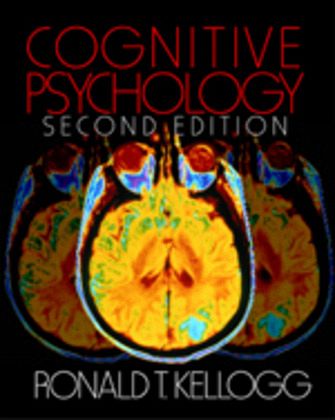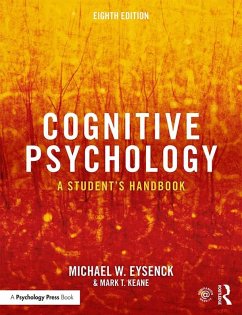Nicht lieferbar

Cognitive Psychology
Versandkostenfrei!
Nicht lieferbar
As with the First Edition , the author provides students with a synthesis of cognitive psychology at its best. The thoroughly revised Second Edition includes: chapters on the development of language, memory and perception; the contribution made by neuroscience and neuroimaging in recent years; and coverage on memory distortions.The book is divided into six sections: Part One introduces the discipline of cognitive psychology and cognitive neuroscience; Part Two covers basic cognitive operations of perception, attention and memory; Part Three addresses learning, knowing and remembering; Part Fou...
As with the First Edition , the author provides students with a synthesis of cognitive psychology at its best. The thoroughly revised Second Edition includes: chapters on the development of language, memory and perception; the contribution made by neuroscience and neuroimaging in recent years; and coverage on memory distortions.
The book is divided into six sections: Part One introduces the discipline of cognitive psychology and cognitive neuroscience; Part Two covers basic cognitive operations of perception, attention and memory; Part Three addresses learning, knowing and remembering; Part Four covers language; and Part Five explores thinking skills and concludes the book with an integrative chapter on intelligence, showing the centrality of cognitive psychology to a highly visible and important arena of psychology as a whole.
`Kellogg's textbook provides outstanding coverage of contemporary cognitive psychology. I especially welcomed chapters on Cognitive Neuroscience, providing neural underpinnings of cognition, and Intelligence. The latter topic is rarely included in books on cognition because the study of intelligence developed in a somewhat separate tradition from experimental cognitive psychology. Yet clearly intelligence should be considered as part of cognitive psychology, too. The coverage in the book is comprehensive and authoritative, but the chapters I read are also quite interesting and accessible. This book should be widely used as a text and a reference work' - Henry L Roediger, III
The book is divided into six sections: Part One introduces the discipline of cognitive psychology and cognitive neuroscience; Part Two covers basic cognitive operations of perception, attention and memory; Part Three addresses learning, knowing and remembering; Part Four covers language; and Part Five explores thinking skills and concludes the book with an integrative chapter on intelligence, showing the centrality of cognitive psychology to a highly visible and important arena of psychology as a whole.
`Kellogg's textbook provides outstanding coverage of contemporary cognitive psychology. I especially welcomed chapters on Cognitive Neuroscience, providing neural underpinnings of cognition, and Intelligence. The latter topic is rarely included in books on cognition because the study of intelligence developed in a somewhat separate tradition from experimental cognitive psychology. Yet clearly intelligence should be considered as part of cognitive psychology, too. The coverage in the book is comprehensive and authoritative, but the chapters I read are also quite interesting and accessible. This book should be widely used as a text and a reference work' - Henry L Roediger, III









